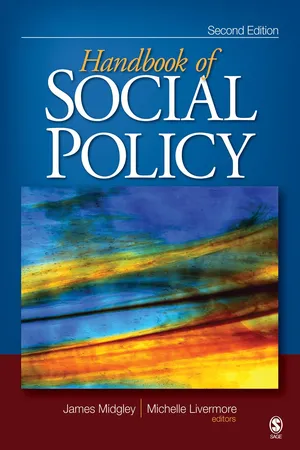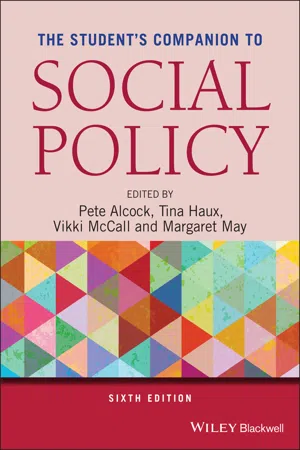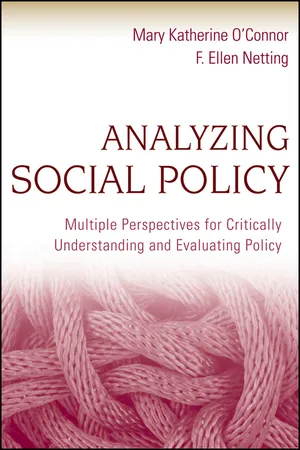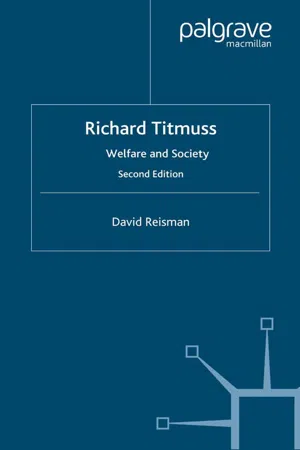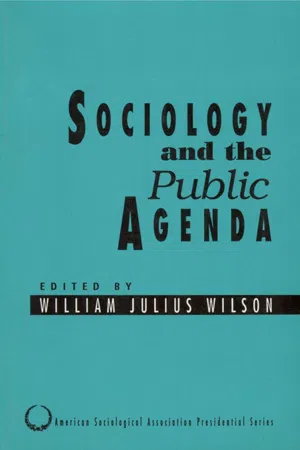Social Sciences
Social Policy
Social policy refers to government actions and interventions designed to address social issues and improve the well-being of individuals and communities. It encompasses a wide range of areas such as healthcare, education, housing, and welfare. Social policy aims to create a more equitable and just society by providing support and resources to those in need.
Written by Perlego with AI-assistance
Related key terms
1 of 5
8 Key excerpts on "Social Policy"
- eBook - ePub
- James Midgley, Michelle Livermore, James O. Midgley, Michelle M. Livermore(Authors)
- 2008(Publication Date)
- SAGE Publications, Inc(Publisher)
The social policies of governments are also being extensively documented, analyzed, debated, and evaluated by social scientists. Although social policies have been subjected to systematic academic inquiry only since the middle decades of the last century, a good deal of knowledge about these policies, their history, objectives, and effects has been acquired, and many important Social Policy issues are currently being analyzed. Social Policy inquiry takes place within schools of public policy; inside academic departments of economics, political science, and sociology; and at schools of social work and social welfare. Although Social Policy is still a relatively new field of academic inquiry, it has grown rapidly in recent years.The term Social Policy thus involves two aspects: first, it refers to the actual policies and programs of governments, policies that affect people’s welfare and, second, it connotes an academic field of inquiry concerned with the description, explanation, and evaluation of these policies. In seeking to define Social Policy, this chapter deals with these two aspects separately. But first, it examines the concept of social welfare, which is the primary goal of government Social Policy.Social Policy and Social Welfare
Scholars have shown that social policies have many different functions. Although these functions have been extensively discussed in the literature, the primary reason for introducing a Social Policy is to enhance conditions of social well-being in society. This can be done in many different ways. For example, governments can provide services to meet the needs of particularly vulnerable or disadvantaged groups such as foster children, low-income families living in inner-city areas, or people with mental illness. Social well-being can also be enhanced by directing resources to particular groups of people through income maintenance programs such as social security or otherwise through the tax system. Governments can also improve conditions of social well-being by controlling pollution or enhancing educational opportunities for children.When social policies have a widespread, positive effect, social conditions in society as a whole improve, producing a condition of social welfare or social well-being. Because the notion of social welfare is a key element in Social Policy, its meaning must be defined at the outset. Accordingly, social welfare will be defined in this book as a condition or state of human well-being that exists when peoples’ needs are met, problems are managed, and opportunities are maximized. The opposite of the condition of social welfare is social illfare. Social illfare exists when human needs are not met, when social problems are not effectively managed, and when there are very limited opportunities for improving life chances. - eBook - PDF
- Pete Alcock, Tina Haux, Vikki McCall, Margaret May, Pete Alcock, Tina Haux, Vikki McCall, Margaret May(Authors)
- 2022(Publication Date)
- Wiley-Blackwell(Publisher)
PART I Concepts and Approaches The Student’s Companion to Social Policy, Sixth Edition. Edited by Pete Alcock, Tina Haux, Vikki McCall and Margaret May. © 2022 John Wiley & Sons Ltd. Published 2022 by John Wiley & Sons Ltd. 1 What is Social Policy? Pete Alcock The Subject of Social Policy Social Policy has a dual meaning. It is used to refer to the actions taken by politicians and policymakers to introduce or amend provisions aimed to promote individual welfare and social well-being. Social pol-icy is what societies do to promote welfare. However, it is also used to refer to the academic study of these policy actions, and their outcomes. Students study Social Policy as an academic subject, perhaps in a single honours degree, or perhaps alongside other social science subjects such as sociology or politics, or as part of professional training for social work or nursing and a wide range of careers in public, com-mercial and voluntary organizations. In essence Social Policy is both social action, and the study of it. The later chapters in this book explore in more detail some of the key concepts and perspectives which have underpinned the study of Social Policy, Overview ■ Social Policy is the use of policy measures to promote the welfare of citizens and social well-being. ■ It is also the term for the academic study of these measures, having changed its name from ‘social administration’ to reflect a broadening concern with the theory as well as the practice of welfare arrangements. ■ The welfare reforms in the UK in the period following the Second World War were critical in establishing the context for subsequent policy development. ■ Social Policy analysts adopt a range of theoretical perspectives, leading to varying con-clusions about the viability and desirability of different measures and interventions. - eBook - ePub
Analyzing Social Policy
Multiple Perspectives for Critically Understanding and Evaluating Policy
- Mary Katherine O'Connor, F. Ellen Netting(Authors)
- 2011(Publication Date)
- Wiley(Publisher)
social policies . This raises the question of what makes a policy “social,” since policies typically involve many people in some ways. Aren't all policies somewhat social? Similar to the health care example just provided, a Social Policy is concerned with problems of individuals or groups in relation to the social context of which they are a part.Jansson (2008) defines social policies as “a collective strategy that prevents and addresses social problems” (p. 9). Building on Jansson's definition and our definition of policy, we are defining social policies as “chosen courses of action within unique contexts with goals of preventing and addressing social problems .” In addition, social policies may contain or lead to principles and procedures that guide a course of action dealing with individual and aggregate relationships in organizations, communities, and societies.So what are social problems? A social problem generally involves issues related to maintaining or achieving quality of life for groups of people. Depending on the context, these concerns can be the result of a wide consensus within members of an organization, community, state, or nation. The concern can also be voiced by the socially powerful or economically privileged. A problem, then, to be considered a social problem rather than an individual one, needs to be big enough (impacting numbers of individuals or groups), severe enough (representing sufficient concern, even danger), or important enough to be called a social problem by those who are powerful enough to name it as such. Thus, Jansson's distinction between “preventing and addressing” is decisively important, since prevention requires different strategies to alert people to potential impact or concern before the social problem has become so obvious to demand a reaction. In the United States, we tend to have trouble dealing with problems before they are defined. - eBook - PDF
- Catherine Bochel(Author)
- 2018(Publication Date)
- Red Globe Press(Publisher)
Thus Social Policy is concerned both with the values and principles which govern distribution as well as their outcome. The task of the Social Policy analyst is to evaluate the distributional impact of existing policies on social welfare, their implicit and explicit rationales, their impact on social relations and the implications of policy proposals (A Walker, 1983, p. 141). Social Policy has also frequently been defined in relation to the major areas of policy which it is commonly seen as encompassing, perhaps most frequently includ-ing education, employment, health, housing, the personal social services and social security. However, as indicated earlier, academics at least are now extend-ing the concept of Social Policy to ‘new’ fields such as the environment, food, transport and even arts and cultural policy (for example, Baldock et al ., 1999; Cahill, 1994). These and other developments, such as the emphasis on social exclusion and inclusion, mean that an approach grounded in ‘areas of policy’ becomes more complicated and cumbersome. In addition, issues such as crime Social Policy AND Social Policy ANALYSIS 11 and criminal justice have sometimes been treated as part of Social Policy and at others have largely been excluded from discussions of Social Policy. Traditionally much of the Social Policy literature was concerned primarily with the role of the state, and in particular with its direct provision of welfare, implying a definition of Social Policy as what the state does in the areas of policy discussed above. Now that there is widespread understanding that a large amount of welfare is provided outside the public sector, Social Policy is often taken to include not only state provisions and decisions but also those of the informal, voluntary and private sectors. Criteria have sometimes been suggested which attempt to enable a distinction to be made between social and other forms of policy. - eBook - PDF
Richard Titmuss; Welfare and Society
Welfare and Society
- D. Reisman(Author)
- 2001(Publication Date)
- Palgrave Macmillan(Publisher)
Part One: The Status of Social Policy 2 The Definition of Social Policy All policy means choice involving change. Policy by its very nature implies that we ‘believe we can affect change in some form or another. We do not have policies about the weather because, as yet, we are powerless to do anything about the weather.’ 1 Yet, precisely because it cannot escape the constraint of choice involving change, precisely because it is action-oriented and problem-oriented, no policy can escape from values, ideologies and images of what constitutes the ‘good society’. Titmuss stressed that human values cannot be ignored in any meaningful discussion of Social Policy. Since in the last analysis, ‘Social Policy is all about social purposes and choices be- tween them’, 2 it was obvious to him that it could never be ‘value-free’: We all have our values and our prejudices; we all have our rights and duties as citizens, and our rights and duties as teachers and students. At the very least, we have a responsibility for making our values clear; and we have a special duty to do so when we are discussing such a subject as Social Policy which, quite clearly, has no meaning at all if it is considered to be neutral in terms of values. 3 Social Policy has its origins in the values of a particular society. It ‘cannot be discussed or even conceptualised in a social vacuum’. 4 Welfare systems tend to ‘reflect the dominant cultural and political characteristics of their societies’. 5 They must be seen ‘in the con- text of a particular set of circumstances, a given society and culture, and a more or less specified period of historical time’. 6 Social Policy, in short, is social because and where needs are defined to be social: ‘All collectively provided services are deliberately designed to meet 29 D. Reisman, Richard Titmuss © David Reisman 2001 - eBook - PDF
- Sudha Menon, University of Kerala, India(Authors)
- 2019(Publication Date)
- Society Publishing(Publisher)
Policy Formulation and Social Science Analysis CHAPTER 2 CONTENTS 2.1. Introduction ...................................................................................... 26 2.2. A Systemic Analysis Of Policymaking ................................................ 28 2.3. Factors Influencing Social Science Policymaking .............................. 30 2.4. Policy Analysis And Social Science ................................................... 31 2.5. Policy-Specific Knowledge Utilization Models .................................. 35 2.6. A Policy Development Framework And The Role Of Researchers ...... 37 2.7. Putting A Policy Development Framework In Context ...................... 37 2.8. Social Assessment And Policy Framework ......................................... 39 References ............................................................................................... 48 Social Science and Policy Challenges 26 The policy formation is a very basic need of an organized society and its proper functioning. The people need to have policies in place so that they know how to deal with a given subject or situation. The policies help the governing bodies and management to keep a check on any undesirable activity in the society and also pose sanctions on the people violating these policies. The chapter informs the readers about the process of policy formation and the relation of social science with such an exercise. It throws light on the political analysis of policies and society for the improvement in such matters. 2.1. INTRODUCTION Policy formulation is the task of the leaders who are being involved in decision-making process in the developed countries. These decision-makers are the representatives of several respective ministries. Policy formulation is the difficult task and therefore the involvement of various people from different background having their common stake should be included for better decision-making and effective policy formulation. - eBook - PDF
- Vic George, Paul Wilding(Authors)
- 2017(Publication Date)
- Bloomsbury Academic(Publisher)
At the Rio Earth Summit in 1992, for example, there were 20,000 participants from 9,000 NGOs from 171 countries. There have been similar manifestations of a new notion of global citizenship in other areas. O’Brien et al ., for example, speak of the four UN Conferences on Women in 1975, 1980, 1985 and 1995 as having Global Social Policy Today 171 acted ‘as great catalysts to the development of women’s organisations and movements nationally and internationally’ and of a global consciousness of gender rights and issues. (O’Brien et al ., 2000, p. 34). Complementing Global Economic Policy Global Social Policy is a corollary of a global(izing) economy. The symbiotic relationship between economic and Social Policy and between trade and Social Policy is now part of conventional wisdom. Globalization is partially econom-ically driven but that does not mean it can sensibly be seen simply in economic terms. As Our Global Neighbourhood put it, ‘Stability requires a carefully crafted balance between the freedom of markets and the provision of public goods’ (Oxford University Press, 1998, p. 135). If stability requires the provision of public goods, so too does economic integration if it is to be sustained (Leibfried and Pierson, 1994, p. 43). Development today is seen as meaning more than simply economic growth. It must be sustainable in the sense of not mortgaging the future for the sake of the present. It must raise all boats not just Olympic racing craft. The quest for sustainability raises major questions about the distribution of wealth, power and opportunity between rich and poor countries and within nation states. These questions suggest an important role for Social Policy – in UNDP’s words ‘to make globalization work for human development’ (UNDP, 1999, p. 9) or as the World Bank puts it ‘global forces need to be harnessed for poor people’ in a wide ranging set of strategies (World Bank, 2000, p. 12). - eBook - PDF
- William Julius Wilson(Author)
- 1993(Publication Date)
- SAGE Publications, Inc(Publisher)
Social scientists who are actively involved in this policy stream, however, quickly discover that their knowledge must be adapted to the practical problems of policymakers to be useful. In other words, policy proposals need to meet the criteria of technical feasibility, budget-ary acceptability, and value acceptability (see above) with which practical people wrestle continually. One development within the policy stream to which social scientists might contribute as much as anybody else is a gradual reorientation of world views or categories within which people think. Within the commu-nity of transportation specialists, for instance, it makes a tremendous difference whether people think of transportation as naturally market-driven or as something that needs central planning. Or within the health insurance policy community, there's a major difference between using insurance simply as a device for paying the bills and using insurance as an instrument for redirecting incentives in health care delivery. Processes of highlighting some problems rather than others or of demonstrating the consequences of various alternatives, among the processes in which social scientists can participate, sometimes contribute to reorienting whole 50 SOCIOLOGY AND THE PUBLIC POLICY AGENDA approaches within policy communities. When the problem of Medicare costs became unmistakably severe, for instance, policymakers changed their orientation toward insurance from simply paying the bills to creating cost-saving incentives. EPILOGUE We often wonder how a given group can get something on a governmen-tal agenda. For that matter, how might social scientists do SO? An impor-tant part of an answer must be that there are very few actors who can get something on an agenda. Persistence is important, of course, as is expertise and cultivating the right connections.
Index pages curate the most relevant extracts from our library of academic textbooks. They’ve been created using an in-house natural language model (NLM), each adding context and meaning to key research topics.
